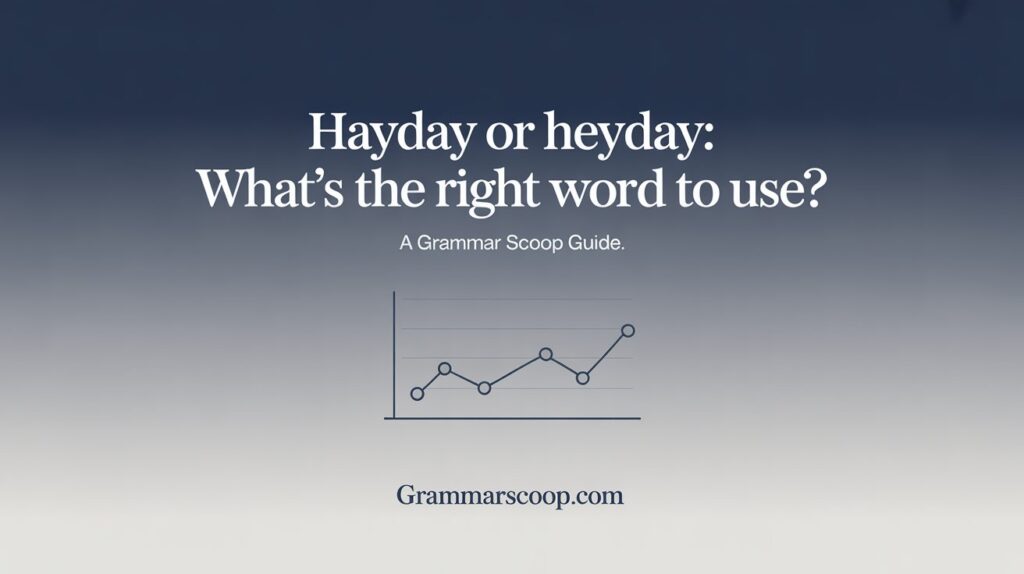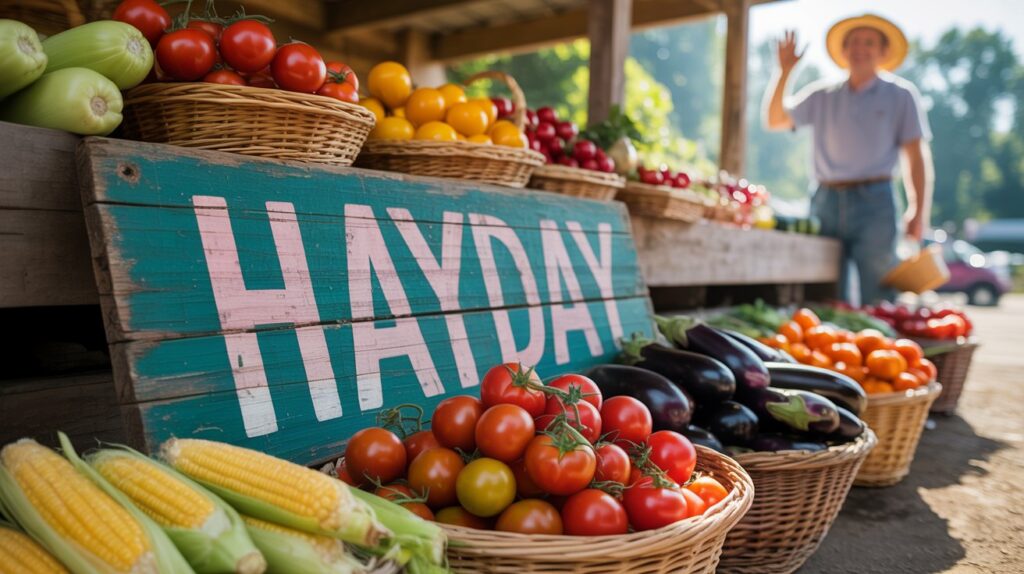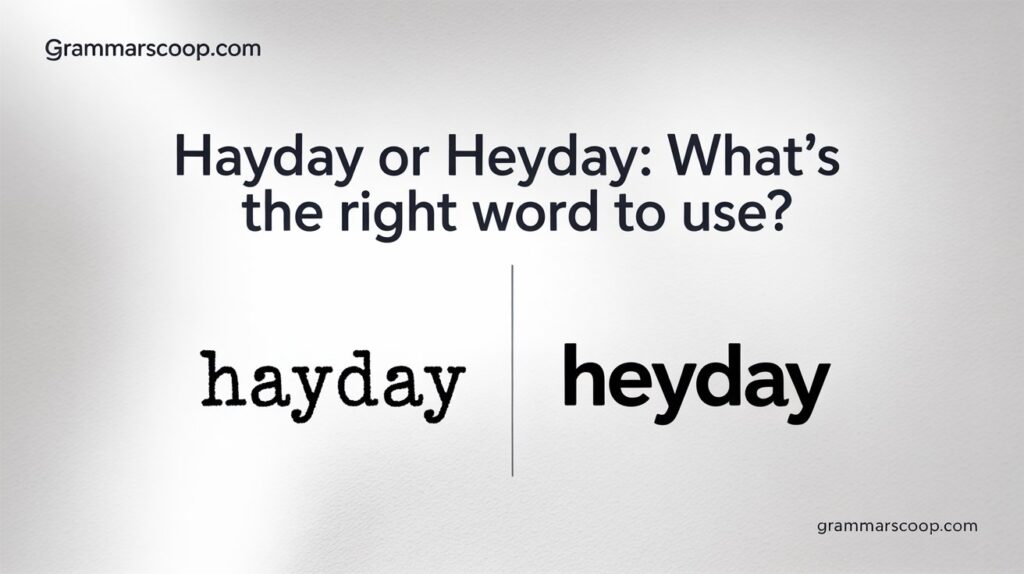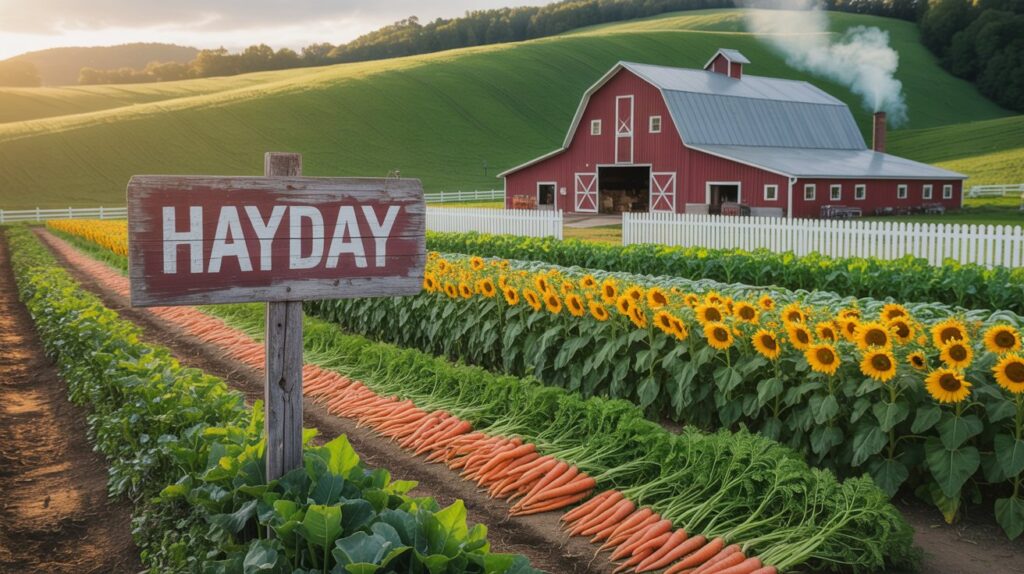Have you ever found yourself typing “hayday” and wondering, “Wait… is that right? Or is it ‘hayday or heyday‘?” You’re not alone. This is one of those confusing word pairs that looks and sounds similar but has a very different backstory. Let’s break it down in detail so you never second-guess yourself again.
Quick Summary
If you’re wondering whether it’s “heyday” or “hayday”, the correct word is “heyday.”
It refers to the peak or prime period of someone’s life, career, or even an era.
“Heyday” means the height of success, popularity, or power.
“Hayday”, “hay day”, or “hey day” are incorrect spellings—except in specific branding contexts, like the mobile game Hay Day.

Here’s a quick breakdown:
| Term | Correct? | Meaning | Usage Example |
|---|---|---|---|
| Heyday | Yes | Prime time of success, growth, or influence | She was a rockstar in her heyday. |
| Hayday | No | Common misspelling of “heyday”; not a real word in formal English | Incorrect: He was popular in his hayday. |
| Hay Day | (unless branded) | A pun used in brand names (e.g., Supercell’s farming game) | Kids love playing Hay Day on their phones. |
| Hey day | No | Another misspelling or typo | Incorrect: That was his hey day. |
Bottom Line:
- Use “heyday” when referring to the best time in someone’s life or a golden era.
- Avoid “hayday,” “hay day,” or “hey day” unless you’re referencing a brand or creative pun.
Next, we’ll break down why this confusion exists, explore what heyday means, and help you never mix them up again.
Hay Day Meaning
The term “hay day” might look familiar, but it’s not the same as “heyday.” Despite how similar they sound, “hay day” is not typically used in modern English as a standalone phrase unless you’re referring to literal farming activities or the popular mobile game called Hay Day.
Literal Meaning of “Hay Day”
In its most literal form, “hay day” refers to:
A day when hay is harvested or gathered — usually during summer on a farm.
This definition is rarely used in everyday conversation unless you’re talking about agriculture. It’s based on actual farming events, often part of seasonal labor cycles.
Example in a Farming Context:
- “We worked all morning during hay day to bring in the bales before the storm.”

What About the Game Hay Day?
The phrase “hay day” gained modern recognition because of the hit mobile farming simulation game called Hay Day by Supercell. The name is a pun—blending the literal farming meaning with the fun and nostalgic tone of the phrase “heyday.”
Fast Facts About Hay Day:
| Feature | Details |
|---|---|
| Developer | Supercell |
| Launch Year | 2012 |
| Platform | iOS, Android |
| Gameplay Style | Farming simulation, resource management |
| Purpose of Name | Wordplay combining “hay” and the idea of fun |
Even though the game popularized the term “hay day” in digital culture, it does not change the fact that “heyday” is the only correct spelling for describing someone’s peak period in formal writing.
Don’t Confuse It with “Heyday”

While “hay day” might sound fun or catchy, especially in branded or humorous settings, using it instead of “heyday” in writing about success or prime time is grammatically incorrect.
Correct: The band was in its heyday during the 80s.
Incorrect: The band was in its hay day during the 80s.
In Summary
- “Hay day” = a real term in farming or a playful pun (like in the game).
- “Heyday” = the correct term for a prime or peak moment in time.
- Don’t let autocorrect or phonetics trick you into using the wrong one!
Why the Confusion Exists in the First Place
There are a few solid reasons why people mix up heyday and hayday:
- Phonetics: They sound nearly identical when spoken.
- Farming Terms: The word “hay” is associated with productive, sunny days on a farm—which might sound metaphorically similar to the concept of a “heyday.”
- Pop Culture: The game Hay Day has cemented this incorrect spelling into the minds of millions.
- Autocorrect: Sometimes devices will incorrectly “fix” your spelling based on usage patterns.
So when someone asks, “Hey day or hay day?” —they’re often responding to these confusing influences.
Meaning and Usage of the Correct Word ‘Heyday’

Definition of Heyday
- Heyday (noun): the period of a person, organization, or thing’s greatest success, popularity, or power.
Examples:
- “In its heyday, MTV changed how the world saw music.”
- “She was in her heyday as an athlete during the early 2000s.”
Grammatical Use
- Part of speech: Noun
- Countable: No (you wouldn’t say “a heyday”)
- Plural form: None (you wouldn’t say “heydays”)
Tone and Register
- Neutral to formal
- Often nostalgic or reflective
- Common in storytelling, journalism, and biographies
Common Misspelling: What About ‘Hayday’?
Now let’s talk about the imposter.
Hayday Meaning (or lack thereof)
There’s no standard English dictionary that defines “hayday” as a proper English word. It’s simply a misspelling.
However, here’s why people still use it:
- Misheard Words: People type what they hear.
- Farm Imagery: “Hay day” can evoke imagery of hard work, sunshine, and productivity.
- Marketing: Brands like to get clever with wordplay. The farming simulation game Hay Day uses this to their advantage.
Is It Ever Acceptable?
Only in informal, stylized, or branded contexts. Otherwise, if you’re writing for school, work, or publication, stick to heyday.
Fun Fact: Google Trends consistently shows more searches for “hayday” than “heyday” — even though the former is technically incorrect.
Real-World Examples in Context
Let’s compare correct and incorrect usage in real sentences.
| Correct Usage (Heyday) | Incorrect Usage (Hayday) |
|---|---|
| “The Beatles ruled the charts in their heyday.” | “The Beatles ruled the charts in their hayday.” |
| “In her heyday, she performed to sold-out crowds.” | “In her hayday, she performed to sold-out crowds.” |
| “MTV’s heyday was in the late ’80s.” | “MTV’s hayday was in the late ’80s.” |
Etymology: Where Does ‘Heyday’ Come From?
This is where things get interesting.
- Origin: Mid-16th century (1500s)
- Derived from the German exclamation “heyda!”
- Originally used as an interjection meaning “hurrah!” or “high spirits!”
- Evolved into a noun referring to a peak of energy or success
Read More:
- Trailer vs Trailor: Which One Is Correct
- Tomorrow or Tommorrow: Which One Is Correct?
- Pickup or Pick up, Pick-Up: What’s the Correct Usage?
- Totalling or Totaling: Which Spelling to Use and Why It Matters
Timeline:
| Century | Usage Evolution |
|---|---|
| 1500s | Used as an exclamation: “Heyday!” |
| 1600s | Began to signify exuberance and youth |
| 1700s+ | Used metaphorically to mean prime period |
Synonyms and Related Words
If you want to spice up your vocabulary or avoid repetition, here are some useful alternatives:
| Synonym | Meaning | Best Used When |
|---|---|---|
| Prime | The peak condition or period | Talking about people, businesses, or eras |
| Pinnacle | The highest point of development | More dramatic or poetic uses |
| Golden age | A period of great achievement | Often used for art, cinema, or history |
| Zenith | Highest point in success | Formal or scientific tone |
| Peak | Top point of intensity or success | Common in casual or business writing |
| Glory days | Nostalgic term for a better time | Informal and emotionally loaded |
“In its heyday, Blockbuster had more than 9,000 stores worldwide. Now, only one remains.”
Memory Trick: How to Remember the Right Word
Here’s a simple way to lock this in:
- Heyday = “Hey! This is the best time ever!”
- Hayday = Only acceptable when you’re baling hay or playing a farm game.
Other Mnemonics:
- Think: HEY! It’s my day!
- Avoid the trap: “Hay” belongs in the barn, not in your grammar.
Pop Culture and Misuse: When ‘Hayday’ Is Used on Purpose
1. Hay Day (Mobile Game)
Supercell’s Hay Day is a popular farming game, which cleverly plays off the pun. But that doesn’t mean it’s grammatically correct.
2. Marketing and Branding
Some businesses or media outlets use “Hayday” deliberately to be witty or memorable. Here are a few examples:
- Clothing stores with rustic farm vibes
- YouTube videos or blog titles using wordplay
- Cafe chains promoting “Fresh Hayday Meals”
That said, unless it’s intentional branding or humor, the correct term is always heyday.
Final Verdict: How to Always Get It Right
Let’s bring it home.
Checklist:
- Formal writing? Use “heyday”
- Describing a peak or prime time? Use “heyday”
- Talking about hay bales? Avoid using “hayday” unless literal or stylized
- Playing a game? Sure, go ahead and type “Hay Day”
Helpful Resources:
Conclusion
So, hayday or heyday? It’s that golden moment when everything clicks—your prime, your spotlight, your time to shine. And while “hay day meaning” might evoke sunny farm vibes, it’s not the word you want in formal or professional writing.
Remember:
- Heyday = the real deal.
- Hayday = a fun but incorrect twist.
The next time someone asks, “hayday or heyday?” —you’ll know exactly what to say.
Use the right word, and let your writing stay in its heyday.

Lisa Morris is a seasoned blogger and language enthusiast with a passion for making grammar simple and engaging. At Grammar Scoop, she shares clear, concise tips that help readers master the rules of English with confidence.






